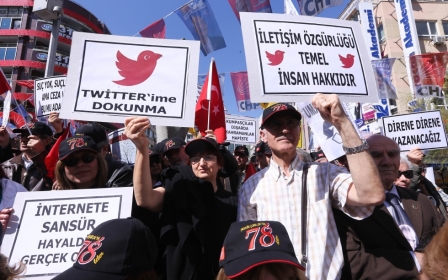Erdogan to launch Euro-tour targeting Turkish expats before elections

Turkey's prime minister will tour several European countries next month, a government source said on Tuesday, as he reaches out to expat Turkish voters ahead of a possible run for the presidency.
Recep Tayyip Erdogan is planning to visit Germany, France and the Netherlands in May, the source said. Each has a large Turkish population that he is hoping to court ahead of presidential elections in August.
Erdogan, who has been prime minister since 2003, is widely expected to run for the presidency although he has yet to announce his candidacy.
According to the Turkish Ministry of Foreign Affairs, there are more than 5 million Turks living abroad, 4 million of which reside in Western European countries.
For the first time, some 2.6 million Turks living abroad -- 1.5 million in Germany alone -- will be able to cast their votes.
Stay informed with MEE's newsletters
Sign up to get the latest alerts, insights and analysis, starting with Turkey Unpacked
Before Erdogan's Islamic-rooted government passed a law in 2012, only five to seven percent of Turks abroad were able to vote in elections, according to electoral authorities, and had to travel to customs offices at Turkey's borders to do so.
The tour will not be official state visits, and it is not yet clear if Erdogan will meet with any European leaders.
Success following local elections
Erdogan is in his third term as prime minister, the maximum allowed under the Justice and Development Party (AKP) rules. It is thought he would expand the largely ceremonial role of the president to give it greater US-style executive powers if elected.
The premier is coming off the back of a resounding victory for the AKP in local elections last month that showed that a recent spate of corruption allegations have done little to dent his support across the country.
"The elections produced only one winner and that is the prime minister himself, not even his party," Yuksel Sezgin, assistant professor of political science at Syracuse University, wrote in an Al Jazeera English column earlier this month.
"Since last year's Gezi demonstrations, he has increasingly personalised politics in Turkey. Even though these elections were local elections in which normally names and personalities of mayoral candidates play a greater role than any other consideration (eg, party identification or ideology), these elections were not about who would collect the garbage in the city, but a referendum on the prime minister staying in power," Sezgin wrote.
The first round of the presidential votes is scheduled for 10 August. A second round, if necessary, will take place on 24 August.
President Abdullah Gul on Friday ruled out a Russia-style job swap with Erdogan and said he had no firm plans yet for his political future.
Also on Tuesday, debates on a motion to set up a parliamentary inquiry committee to investigate four former ministers accused of corruption have been postponed to next week, said AK Party Parliamentary Group Chairman Ahmet Aydin on Tuesday.
Former economy minister Zafer Caglayan, former interior minister Muammer Guler and former urbanisation minister Erdogan Bayraktar resigned while former EU minister Egemen Bagis was discharged in a cabinet reshuffle after an anti-graft probe was launched on 17 December last year.
Erdogan: National elections will not bring uncertainty
Meanwhile, Erdogan has said the government will not let August's presidential elections bring about uncertainty for Turkey.
Speaking at his Justice and Development Party group meeting in parliament on Tuesday, Erdogan said, "Those who expect economic and political uncertainties in Turkey during and after the presidential elections will be disappointed.
"Our party is after the goals of 2023, which are appreciated and affirmed by the Turkish people and we will accomplish these goals," he said, referring to economic and political reforms designed to make Turkey one of the 10 most developed economies in the world by its 100th foundation anniversary.
Erdogan added that the candidate-determining process within the party had been ongoing and he had also been consulting President Abdullah Gul.
Stating that the government would not allow unions to hold demonstrations and rallies in Istanbul's Taksim Square, Erdogan said that the Istanbul governorate had allocated the two main squares in the city for May 1 rallies.
Calling on unions to refrain from violence on the streets during the 1 May Workers' Day rallies, Erdogan said, "May 1 has a history of 124 years in Turkey, and we honour it with the honour it deserves. In 2008, our government declared it as the Labour and Solidarity Day.
"I hereby call on all unions and all other involving organisations not to clash with the state on the day of solidarity and peace."
Erdogan attacked opposition parties for asking the government to close the doors to Syrian refugees and remain silent about the death penalties of 528 Muslim Brotherhood members in Egypt.
"We cannot shut the doors to the dying, starving Syrians appealing to our country, regardless of their race and religion," added Erdogan.
Although the European Union, the US and Russia were all silent on the death penalties in Egypt, he said Turkey would never stay quiet about the violation of human rights in Egypt.
Middle East Eye delivers independent and unrivalled coverage and analysis of the Middle East, North Africa and beyond. To learn more about republishing this content and the associated fees, please fill out this form. More about MEE can be found here.



